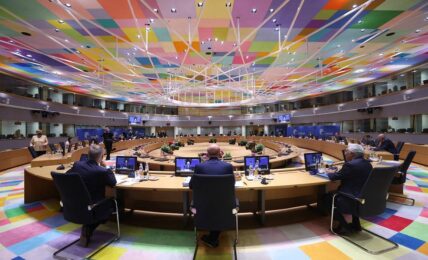UK ad regulator the Advertising Standards Authority (ASA) ruled Thursday that ads by HSBC highlighting the bank’s climate-focused actions were misleading, as they omitted information about HSBC’s continued financing activities for emissions-intensive industries and businesses.
HSBC was ordered to not display the ads again, and to provide context into its contribution to CO2 and greenhouse gas (GHG) emissions in future marketing communications featuring environmental claims.
The ruling referred to ads displayed in bus stops in London and Bristol in October 2021, in the run-up to the COP26 climate conference, promoting HSBC’s initiatives to provide up to $1 trillion in finance and investment to help clients transition to net zero, and to help plant 2 million trees. According to the ASA, the regulator received numerous complaints about the ads, claiming that they were misleading by omitting HSBC’s contribution to CO2 and GHG emissions.
The ruling comes as financial institutions and other companies increasingly face regulatory scrutiny over greenwashing concerns. Earlier this year, the CEO of Deutsche Bank’s investment arm DWS resigned after police raided the firms’ Frankfurt offices as part of an investigation into greenwashing allegations. Last month, fashion retailer H&M said that it would remove sustainability-related labels from its products following an investigation by Dutch regulator the Netherlands Authority for Consumers and Markets (ACM) into its green claims.
One of the organizations filing complaints was Adfree Cities, an organization advocating for “healthier cities free from the pressures of corporate outdoor advertising.” Following the ruling, Adfree Cities said in a social media post that “from today, banks are on notice over greenwashing.”
HSBC unveiled its climate finance target in 2020, aiming to support customers with between $750 billion and $1 trillion of finance and investment by 2030 to help with their low-carbon transition, alongside a commitment to align its financing activities with the goals of the Paris Agreement.
The bank’s climate goals, however, faced scrutiny from sustainable investment groups such as ShareAction, which led a campaign calling on HSBC, Europe’s second largest financier of fossil fuels, to publish a strategy to reduce its exposure to fossil fuel assets. HSBC subsequently introduced commitments, supported by ShareAction, to phase down fossil fuel financing, and to review clients’ transition plans to assess whether to provide financing services. The bank has also unveiled financed emissions reduction targets for the carbon intensive Oil & Gas and Power & Utilities sectors, and a commitment to phase out financing of coal-fired power and thermal coal mining.
According to the ASA, HSBC argued that the ads were not misleading, as they referred to specific initiatives underway by the bank, including its ambition to provide financing and investment to help its clients transition to net zero, and its partnership with the National Trust, aimed at planting 2 million trees by 2025. HSBC pointed out that its Climate Strategy is consistent with the Science Based Targets Initiative’s (SBTi) outline for financial institutions to align financing with 2050 net zero pathway and to set interim 2030 targets. HSBC also said that their plan to phase down fossil fuel financing is consistent with recommended approaches such as that of the Glasgow Financial Alliance for Net Zero (GFANZ).
In the ASA’s ruling, however, the regulator said that despite HSBC’s commitments, the ads would lead consumers to understand “that HSBC was making, and intended to make, a positive overall environmental contribution as a company,” and that consumers would not expect that HSBC “would also be simultaneously involved in the financing of businesses which made significant contributions to carbon dioxide and other greenhouse gas emissions and would continue to do so for many years into the future.” ASA pointed out that HSBC’s financed emissions stand at over 65 million tonnes of Co2 per year for oil and gas alone, and that the bank intended to continue to fund thermal coal mining to some degree for several years.
The ASA stated in its ruling:
“We concluded that the ads omitted material information and were therefore misleading.”
The post Regulator Bans HSBC Ads Highlighting Green Activities as Misleading appeared first on ESG Today.



